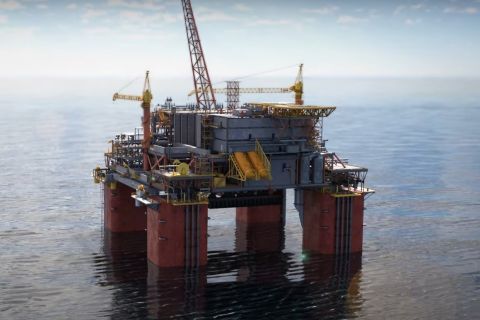Knowing an industry from top to bottom is a task few ever achieve, but Joel D. Moxley has been a part of it all. First and foremost, he stresses the importance of staying grounded.
Moxley graduated in 1980 with a Bachelor of Science degree in chemical engineering from Rice University. From that time on, he has worked for more than 30 years in multiple areas of the midstream business, in a gamut of positions including engineering, operations, marketing and business development. He has held positions with Valero Energy Corp., PG&E Corp., El Paso Corp., Enterprise Products Partners LP and Crosstex Energy LP in that time.
Choosing to venture out and build a new company, Moxley joined Crestwood Midstream Partners LP in April 2008. Crestwood has enjoyed early successes since its beginning, including the recent acquisition in April of 2011 of assets in the Fayetteville shale and Granite Wash plays from Tulsa, Oklahoma-based Frontier Gas Services LLC. Moxley was named chief operating officer of the company in August 2011.

“Acquisitions and business development, in general, is a lot like fishing. You’ve got to throw several lines in the water before you can catch something.” — Joel Moxley, chief operating officer, Crestwood Midstream Partners LP
MIDSTREAM: You've been in just about every area of the midstream business, with a lot of different companies. What was it like building your own?
MOXLEY: It is actually a lot of fun, building a company. We started this company less than a year ago, and we've gone from six employees in a single office in Houston to having over 130 employees in several areas. We are really trying to build something special over the next few years. In all honesty, the process is hard. You've got to spend a lot of time thinking and planning. But it has been rewarding to see the fruits of our labor.
MIDSTREAM: Crestwood has enjoyed another great quarter.
MOXLEY: Yes, we had another good quarter. It's just a matter of executing our plan. Our Barnett volumes are continuing to grow, and we have a great relationship with our primary customer, Quicksilver Resources Inc. We continue to build out our Barnett pipeline systems, principally in our Alliance area. We also spent time in the second quarter integrating the Frontier assets into Crestwood. So we're just trying to block, tackle, and do the things that we know how to do to continue to grow the company.
MIDSTREAM: Are you considering other shales in your growth strategy? Such as the Eagle Ford or the Marcellus?
MOXLEY: We would opportunistically look into any one of those. Finding the right entry point is the trick. We've positioned ourselves as a pure shale midstream company, so if the opportunity came to get into the Eagle Ford, the Marcellus, the Haynesville or the Niobrara, we would certainly look hard at that. We are always going to look for something new, whether it's an acquisition or organic opportunity. We've seen several things come through over the last few months, which is exciting. Acquisitions and business development, in general, is a lot like fishing. You've got to throw several lines in the water before you can catch something.
MIDSTREAM: Considering all this growth, what do you find the most exciting?
MOXLEY: It's exciting to see the amount of capital that is being spent in Midstream because of the shale drilling. Even in areas like the Haynesville that have historical Cotton Valley production, you still have to build new infrastructure. So it's an opportunity to really re-make the midstream industry in a lot of ways
MIDSTREAM: Are you looking at any new projects to build?
MOXLEY: Yes. At our Indian Creek processing facility in the Texas Panhandle, Frontier had committed to buying an additional processing unit, so we're looking for an opportunity to install that. We also have a small system out in Southeast New Mexico where producers are in the early stages of developing Bone Springs and Avalon, so we are working that area to see if we use those assets as a building block to grow something bigger. The infrastructure in New Mexico has been a pretty mature area, but with the newer wells and horizontal drilling, comes higher production rates, so you have to build larger pipelines.
Recommended Reading
E&P Highlights: March 11, 2024
2024-03-11 - Here’s a roundup of the latest E&P headlines, including a new bid round offshore Bangladesh and new contract awards.
Galp Seeks to Sell Stake in Namibia Oilfield After Discovery, Sources Say
2024-04-22 - Portuguese oil company Galp Energia has launched the sale of half of its stake in an exploration block offshore Namibia.
Deepwater Roundup 2024: Offshore Australasia, Surrounding Areas
2024-04-09 - Projects in Australia and Asia are progressing in part two of Hart Energy's 2024 Deepwater Roundup. Deepwater projects in Vietnam and Australia look to yield high reserves, while a project offshore Malaysia looks to will be developed by an solar panel powered FPSO.
Iraq to Seek Bids for Oil, Gas Contracts April 27
2024-04-18 - Iraq will auction 30 new oil and gas projects in two licensing rounds distributed across the country.
NAPE: Chevron’s Chris Powers Talks Traditional Oil, Gas Role in CCUS
2024-02-12 - Policy, innovation and partnership are among the areas needed to help grow the emerging CCUS sector, a Chevron executive said.



